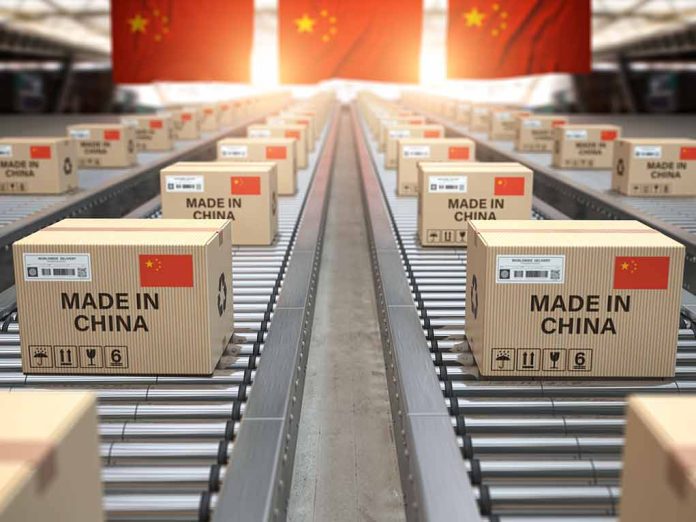
Deceptive “American-made” labels cost Williams Sonoma a record $3 million penalty after a vigilant mother exposed their Chinese-made products falsely marketed as “crafted in the USA.”
Key Takeaways
- Williams Sonoma paid a record $3 million civil penalty for falsely marketing over 800 products as American-made on their websites in 2019.
- The FTC requires products labeled “Made in the USA” to be all or virtually all manufactured domestically with U.S.-sourced components.
- Consumers should be wary of ambiguous terms like “Assembled in USA” or “Crafted in USA” which often disguise foreign manufacturing.
- To verify authentic American-made products, check for exact “Made in the USA” labeling and contact manufacturers directly about product origins.
Mother Uncovers Major Labeling Deception
When Mary Schubart went shopping for bedding for her twins, she had two priorities in mind: safety and supporting the American economy. Like many patriotic Americans, she specifically sought out products marketed as made in the United States. Schubart purchased mattress pads from Pottery Barn Teen which were advertised as “crafted in the USA.” Upon receiving her order, she made a disturbing discovery—the products were actually manufactured in China, completely contradicting the American-made marketing claims that had influenced her purchasing decision.
Rather than simply returning the items, Schubart took action against this deceptive practice. She reported the misleading labeling to Truth in Advertising, a nonprofit watchdog organization dedicated to protecting consumers from false advertising. What Schubart didn’t know was that her complaint would lead to a significant legal action against one of America’s largest retail companies. Truth in Advertising had previously flagged Pottery Barn Teen for making false “Made in the USA” claims to the Federal Trade Commission (FTC), making this new evidence particularly damning.
Record Penalties for “Made in USA” Fraud
Schubart’s vigilance triggered a major investigation that uncovered a widespread problem. Over 800 products had been falsely marketed as American-made across Williams Sonoma websites in 2019, including items from their Pottery Barn Teen, Pottery Barn Kids, and West Elm brands. This systematic misrepresentation of foreign-made products as American resulted in the FTC imposing a record $3 million civil penalty against Williams Sonoma, sending a clear message about the seriousness of such deceptive practices.
When confronted with the evidence, Williams Sonoma attributed the issue to an “administrative mistake” and issued an apology to customers. The company promised to implement improved processes to prevent such mislabeling in the future. However, this case highlights a broader problem facing American consumers who want to support domestic manufacturing but struggle to identify genuinely American-made products amid a sea of misleading marketing claims designed to capitalize on patriotic shopping preferences Stated Williams Sonoma.
Understanding “Made in USA” Requirements
The Federal Trade Commission maintains strict guidelines about what constitutes a legitimate “Made in the USA” product. According to these regulations, items bearing this label must be “all or virtually all” manufactured domestically, with all significant components sourced within the United States. This standard is deliberately stringent to protect American manufacturing and ensure transparency for consumers who specifically seek out domestic products. However, companies often exploit loopholes and ambiguous language to create the impression of American manufacturing while outsourcing production to foreign countries According to The Federal Trade Commission.
A current lawsuit against Reynolds Aluminum foil further illustrates the complexity of these requirements. The lawsuit challenges Reynolds’ “Made in the USA” label because the raw materials used in their aluminum foil are sourced from outside the United States. This case highlights the ongoing battles over what percentage of a product must be truly American to justify domestic manufacturing claims, and how easily consumers can be misled by products that appear American but contain significant foreign components or labor.
How to Identify Genuine American Products
For conservatives who prioritize supporting American businesses and manufacturing jobs, identifying genuinely domestic products requires vigilance and knowledge. When shopping, be especially cautious about vague terminology like “Assembled in USA,” “Crafted in USA,” or “Designed in USA.” These carefully worded phrases often indicate that significant portions of the manufacturing process occurred overseas, with only final assembly or design work completed domestically. The only truly reliable designation is the exact phrase “Made in the USA” without qualifying language.
To verify a product’s origins, consumers should check the brand’s website for manufacturing information or contact companies directly with specific questions about where their products are made. Third-party verification through organizations like Made in USA Certified can provide additional confidence. In the digital age, it’s also wise to research companies online before purchasing, as other consumers often share experiences with misleading labeling. Taking these extra steps ensures that your purchasing dollars actually support American workers rather than contributing to the very outsourcing that has decimated our manufacturing sector.
The Impact of Deceptive Labeling on America First Policies
President Trump’s emphasis on American manufacturing and “Buy American” initiatives has increased consumer interest in domestically produced goods. However, deceptive labeling practices undermine these policy goals by allowing foreign-made products to capture market share intended for American manufacturers. Every dollar spent on a falsely labeled “American” product represents lost wages for American workers and tax revenue for American communities. The Williams Sonoma case demonstrates that even major American retailers may be complicit in this deception, whether through deliberate misrepresentation or negligent oversight of their supply chains, Stated President Trump.
For American manufacturing to truly experience a resurgence, consumers must remain vigilant against these deceptive practices. By demanding transparency, reporting violations to regulatory authorities, and supporting companies that maintain genuine American manufacturing operations, consumers can play a crucial role in preserving and expanding domestic production. The record fine against Williams Sonoma sends a strong message to other retailers that exploiting patriotic sentiment through false claims of American origin will result in significant consequences, protecting both consumers and legitimate American manufacturers from unfair competition.



